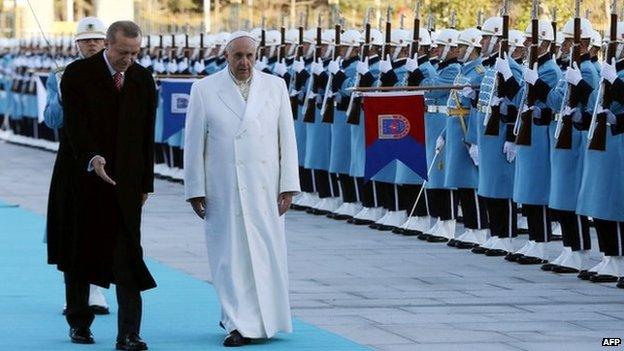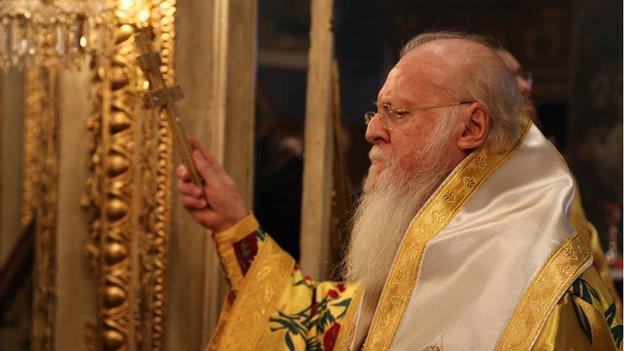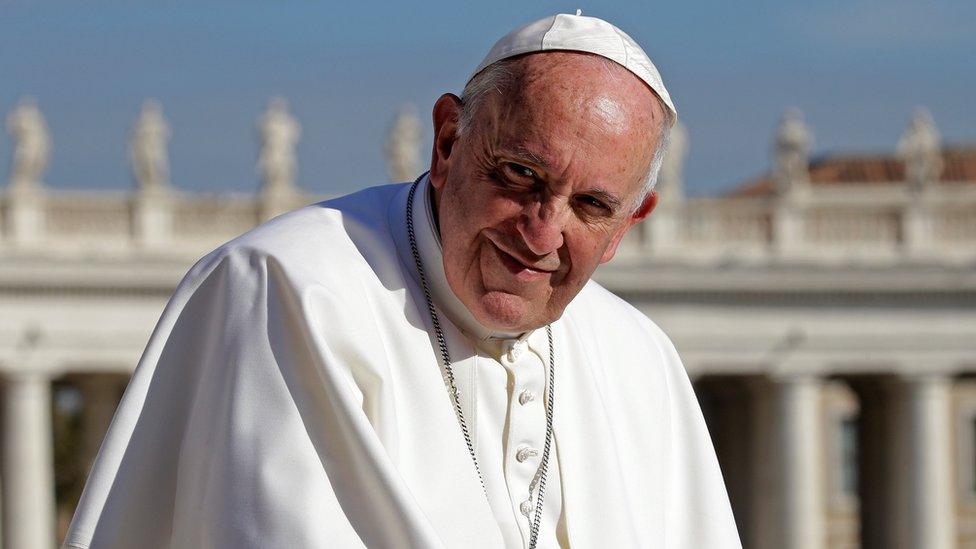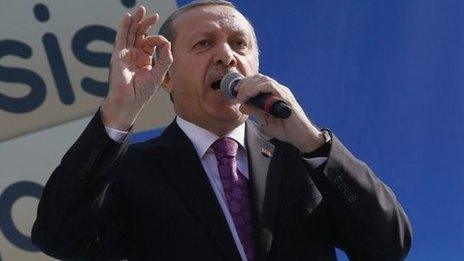Pope Francis in Turkey urges faiths to combat fanaticism
- Published
Pope Francis urges religious freedom and more help for refugees
Pope Francis has called for an interfaith dialogue to counter fanaticism and fundamentalism, at the start of a key visit to Turkey.
In a speech in Ankara, he also called for a renewed Mid-East peace push, saying the region had "for too long been a theatre of fratricidal wars".
He also urged more help for refugees from Syria and Iraq.
Turkish President Recep Tayyip Erdogan said the visit was a "significant" step to enhance regional peace.
The Pope's three-day trip - only the fourth visit by a pope to Muslim-majority Turkey - comes as Turkey hosts 1.6m refugees on its southern border, after Islamic State seized swathes of neighbouring Syria and Iraq.

Mark Lowen, BBC News, Ankara
Pope Francis may have had a horse-drawn parade and cannon salute as he entered the lavish presidential compound but there were none of the thousands of people lining the streets as he often receives.
The Pope is being welcomed by Turks as the leader of a faith that is not their own: this is a country which is now 99% Muslim, its long Christian heritage as once the centre of the largely-Christian Byzantine Empire less and less visible.
And yet it is Turkey's historical position as a meeting point of religions and cultures which makes this country a perfect place from which to spread his message of inter-faith dialogue.
Turkey bridges a principally Christian Europe and a mainly Muslim Middle East. While the Pope has denounced the persecution of Christians, Turkey's president says the West must do more to combat Islamophobia. Pope Francis is urging respect and cooperation by each side for the other.

After arriving in Ankara on Friday, Pope Francis held talks with President Erdogan - whose AK Party is rooted in political Islam - and Mehmet Gormez, Turkey's top cleric.
In a speech at a press conference, the Pope called for "a dialogue which can deepen the understanding and appreciation" between faiths.
He said: "Fanaticism and fundamentalism, as well as irrational fears which foster misunderstanding and discrimination, need to be countered by the solidarity of all believers."

This is only the fourth visit by a pope to Muslim-majority Turkey

The Pope called on nations of the Middle East to "reverse the trend" and advance peace in the region.
He said: "Interreligious and intercultural dialogue can make an important contribution to attaining this lofty and urgent goal, so that there will be an end to all forms of fundamentalism and terrorism which gravely demean the dignity of every man and woman and exploit religion."
Turning to the conflicts in Syria and Iraq, he said the international community had a moral duty to assist Turkey in taking care of refugees.
"In addition to providing much needed assistance and humanitarian aid, we cannot remain indifferent to the causes of these tragedies," he said.
He condemned the "violation of the most basic humanitarian laws" by extremists and the persecution of Christian and other minorities.
President Erdogan said the Pope's visit was "a very significant and very crucial step which will enhance the hopes of peace in our region".
He said: "Racism and Islamophobia in the West, and violence and terrorism in Islamic lands make it important that we come together and co-operate."
Mr Erdogan also condemned what he termed the international "silence" over the "state terror" being instigated by the Syrian government.
Blue Mosque
Pope Francis is the first foreign dignitary to visit the lavish 1,000-room presidential palace in Ankara.
Mark Lowen reports on the state of Christianity in Turkey ahead of the Pope's visit
According to Hurriyet newspaper, the Pope - who is renowned for his humble lifestyle - requested a "modest car" for his trip. He was picked up at the airport by a black Volkswagen saloon.
On Saturday, the Pope will travel to Istanbul, where he is scheduled to visit Sultan Ahmed mosque, the 17th Century place of worship popularly known as the Blue Mosque.
He is also due to sign a joint declaration with Patriarch Bartholomew I, the leader of 300 million Orthodox Christians, on trying to bridge the divides between Catholicism and Orthodox Christianity.
Although most of Turkey's 80 million citizens are Muslims, there are about 120,000 Christians in the country - once the centre of the Orthodox Christian world.

Turkish media on Pope's visit
Turkish media seems most concerned with the security arrangements for the Pope's visit. Posta, externaluses the headline "Martial law" to describe heavy security in Ankara and Istanbul.
Other papers take a more neutral tone and talk about his agenda, with some anticipation about the Pope being the first visitor to the new "presidential palace". Hurriyet, external speculates that President Erdogan's message to the Pope might be: "Let's stop Islamophobia".
The independent news portal says the treatment of Christian minorities in the Middle East is likely to top the Pope's agenda.
One of the secular papers, Daily Cumhuriyet, external, quotes a senior Turkish religious official who takes issue with the Vatican's idea of inter-religious dialogue, saying: "The discourse of the Church should change".
- Published27 November 2014

- Published28 October 2022

- Published20 November 2014
